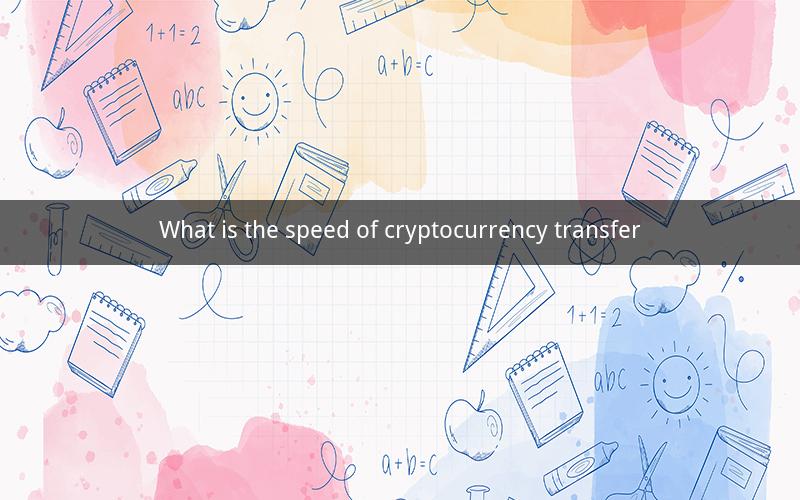
Understanding Cryptocurrency Transfer Speeds
Table of Contents
1. Introduction to Cryptocurrency Transfer Speeds
2. Factors Influencing Transfer Speeds
1. Network Congestion
2. Blockchain Size
3. Transaction Fees
4. Network Latency
5. Cryptocurrency Type
3. Common Cryptocurrency Transfer Times
4. Comparison of Transfer Speeds Between Different Cryptocurrencies
5. How to Speed Up Cryptocurrency Transfers
6. Future Outlook for Cryptocurrency Transfer Speeds
7. Conclusion
1. Introduction to Cryptocurrency Transfer Speeds
Cryptocurrency transfers have revolutionized the way we send and receive money across the globe. Unlike traditional banking systems, cryptocurrency transfers offer a faster and more cost-effective solution. However, the speed of these transfers can vary significantly, depending on several factors. In this article, we will delve into the world of cryptocurrency transfer speeds, exploring the various factors that influence them, common transfer times, and how to optimize the process.
2. Factors Influencing Transfer Speeds
2.1 Network Congestion
One of the primary factors affecting cryptocurrency transfer speeds is network congestion. When a large number of transactions are being processed simultaneously, the network can become overloaded, leading to longer processing times. This is particularly true during peak times, such as weekends or holidays, when users are more likely to make transactions.
2.2 Blockchain Size
The size of the blockchain also plays a crucial role in determining transfer speeds. Larger blockchains, such as Bitcoin's, take longer to process transactions due to the increased number of blocks that need to be validated and added to the chain. In contrast, smaller blockchains like Litecoin or Dogecoin can process transactions much faster.
2.3 Transaction Fees
Transaction fees are another critical factor influencing transfer speeds. Users can choose to pay higher fees to prioritize their transactions, ensuring faster processing. However, paying lower fees may result in longer wait times.
2.4 Network Latency
Network latency refers to the time it takes for data to travel from one point to another. High latency can cause delays in transaction processing, particularly when the sender and receiver are geographically distant.
2.5 Cryptocurrency Type
Different cryptocurrencies have varying levels of efficiency in terms of transfer speeds. For instance, Bitcoin is known for its slower transfer times compared to other altcoins like Ethereum or Ripple.
3. Common Cryptocurrency Transfer Times
3.1 Bitcoin
Bitcoin transfers typically take between 10 to 60 minutes, depending on the network congestion and transaction fees. During peak times, it may take several hours or even days for a Bitcoin transaction to be confirmed.
3.2 Ethereum
Ethereum transactions are generally faster than Bitcoin, taking approximately 15 to 30 minutes for confirmation. However, this can vary based on network congestion and transaction fees.
3.3 Litecoin
Litecoin offers one of the fastest transfer times among major cryptocurrencies, with confirmations typically taking less than 2.5 minutes.
3.4 Ripple
Ripple's transfer speed is significantly faster than other cryptocurrencies, with transactions confirmed in seconds.
4. Comparison of Transfer Speeds Between Different Cryptocurrencies
| Cryptocurrency | Average Transfer Time |
|----------------|----------------------|
| Bitcoin | 10-60 minutes |
| Ethereum | 15-30 minutes |
| Litecoin | Less than 2.5 minutes |
| Ripple | Seconds |
5. How to Speed Up Cryptocurrency Transfers
5.1 Pay Higher Transaction Fees
To speed up your cryptocurrency transfers, consider paying higher transaction fees. This will incentivize miners to prioritize your transaction, ensuring faster processing.
5.2 Optimize Transaction Size
Minimize the size of your transaction by removing unnecessary data. Smaller transactions are processed faster than larger ones.
5.3 Choose the Right Cryptocurrency
Select a cryptocurrency with faster transfer speeds, such as Litecoin or Ripple, to ensure a quicker transaction experience.
5.4 Monitor Network Congestion
Stay informed about network congestion levels and plan your transactions accordingly. During peak times, it's best to avoid making transactions or opt for cryptocurrencies with faster processing times.
6. Future Outlook for Cryptocurrency Transfer Speeds
The future of cryptocurrency transfer speeds looks promising, with ongoing advancements in blockchain technology. Faster blockchains, improved network infrastructure, and enhanced consensus algorithms are expected to reduce processing times and improve the overall user experience.
7. Conclusion
Cryptocurrency transfer speeds play a vital role in the adoption and usage of digital currencies. Understanding the factors that influence transfer speeds and taking appropriate measures to optimize the process can significantly enhance your experience with cryptocurrencies.
Questions and Answers
1. What is the primary factor affecting cryptocurrency transfer speeds?
- Network congestion
2. Why do Bitcoin transfers take longer than Litecoin?
- Bitcoin has a larger blockchain, requiring more time to process transactions.
3. Can I speed up my cryptocurrency transfer by paying lower fees?
- No, lower fees may result in longer wait times.
4. How can I monitor network congestion levels?
- Use blockchain explorer websites or cryptocurrency wallet apps that provide real-time data on network congestion.
5. Which cryptocurrency offers the fastest transfer speeds?
- Ripple
6. Can I use the same cryptocurrency for both sending and receiving transactions?
- Yes, you can use the same cryptocurrency for both sending and receiving transactions.
7. How can I ensure my cryptocurrency transaction is secure?
- Use a reputable wallet, enable two-factor authentication, and keep your private keys secure.
8. Can I cancel a cryptocurrency transaction after sending it?
- No, once a cryptocurrency transaction is sent, it cannot be canceled.
9. How can I track the status of my cryptocurrency transaction?
- Use blockchain explorer websites or cryptocurrency wallet apps that provide real-time transaction tracking.
10. What is the difference between blockchain and cryptocurrency?
- Blockchain is the technology that underpins cryptocurrencies, while cryptocurrency refers to the digital or virtual currencies that use blockchain technology.